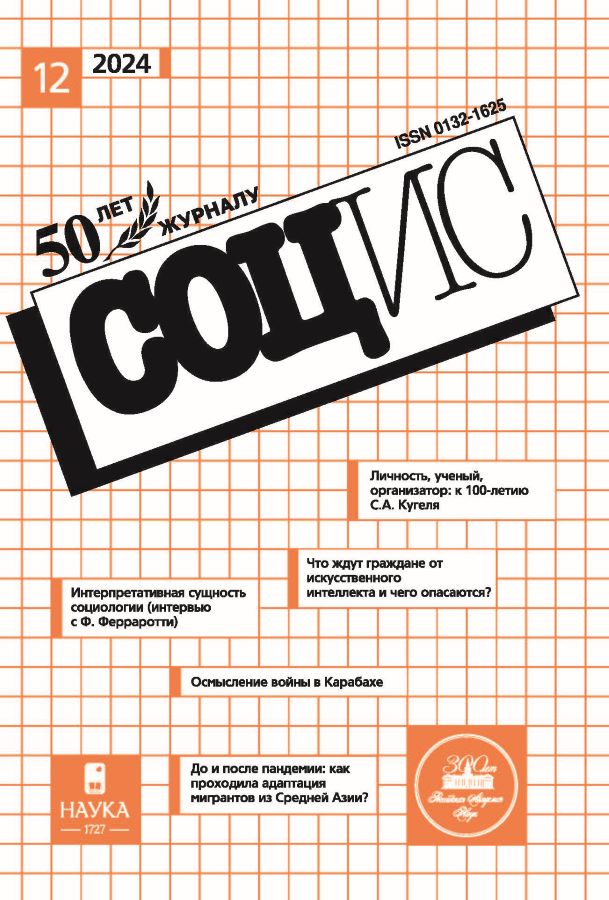Expansion of artificial intelligence: expectations and attitudes of citizen
- Authors: Levashov V.K.1, Grebnyak O.V.1
-
Affiliations:
- Institute of Socio-Political Research of FCTAS RAS
- Issue: No 12 (2024)
- Pages: 13-23
- Section: SOCIAL REALITIES: THE CHALLENGES OF THE TIMES
- URL: https://bulletin.ssaa.ru/0132-1625/article/view/683565
- DOI: https://doi.org/10.31857/S0132162524120022
- ID: 683565
Cite item
Abstract
Interest in artificial intelligence and specifically in neural networks is not declining in society, but there is a noticeable change in the emphasis that attracts the attention of Russians. Mass availability and vast opportunities initially gave rise to fears about the displacement of ‘live’ labour force from the labour market and mass replacement by artificial intelligence in all easily algorithmised industries. Changes in the labour market have indeed occurred, but these changes, as well as user experimentation with neural networks, have brought new concerns to the forefront. Based on data from the annual monitoring of permanent and current socio-political indicators conducted by the Institute of Socio-Political Research of FCTAS RAS, as well as other available generative artificial intelligence research, the authors trace the social sentiment associated with the mass adoption and use of artificial intelligence and neural networks. Data from June 2024 shows that concerns about employment have been replaced by fears about the penetration of digital reality into social reality in the form of misinformation, scams, spoofs and dipfakes. The change in the information agenda has not reduced the level of citizens’ anxiety and requires attention from researchers.
Full Text
About the authors
Victor K. Levashov
Institute of Socio-Political Research of FCTAS RAS
Author for correspondence.
Email: levachov@mail.ru
Dr. Sci. (Sociol.), Director
Russian Federation, MoscowOksana V. Grebnyak
Institute of Socio-Political Research of FCTAS RAS
Email: oksananov@yandex.ru
Researcher
Russian Federation, MoscowReferences
- Dubrovsky D. I. (2022) The Development of Artificial Intelligence and the Global Crisis of Earthly Civilization (to the Analysis of Socio-Humanitarian Problems). Filosofija nauki i tehniki [Philosophy of Science and Technology]. Vol. 27. No. 2: 100–107. doi: 10.21146/2413-9084-2022-27-2-100-107. (In Russ.)
- Ivanov D. V. (2000) Virtualization of Society. St. Petersburg, St. Petersburg Oriental Studies Centre. (In Russ.)
- Keynes J. M. (2009) Economic Possibilities for our Grandchildren. Voprosy Ekonomiki [Economic issues]. No. 6: 60–69. (In Russ.)
- Levashov V. K., Berezina N. V., Velikaya N. M. [et al.] (2024a) Russian Society and State: Foundations of Sustainability and Trends of Change. Social and socio-political situation. Moscow: FCTAS RAS. doi: 10.19181/monogr.978-5-89697-428-4.2024. (In Russ.)
- Levashov V. K., Velikaya N. M., Shushpanova I. S. [et al.] (2024b) How are you, Russia? Express information. stage of the sociological monitoring, April 2024. Moscow: FCTAS RAS. doi: 10.19181/monogr.978-5-89697-429-1.2024. (In Russ.)
- Levashov V. K., Grebnyak O. V. (2023) Russian Citizens on the Challenges of Artificial Intelligence, Neural Networks and Social Optimism. Sotsiologicheskie issledovaniya [Sociological Studies]. No. 11: 115–120. doi: 10.31857/S013216250028537–3. (In Russ.)
- Levashov V. K., Velikaya N. M., Shushpanova I. S. [et al.] (2023) How are you, Russia? Express information. 53rd stage of the sociological monitoring, June 2023. Moscow: FCTAS RAS. doi: 10.19181/monogr.978-5-89697-418-5.2023. (In Russ.)
- Vasilenko L. A., Meshcheryakova N. N. (2023) Digital Hybridity: Innovative Reality or Utopia? Filosofija nauki i tehniki [Philosophy of Science and Technology]. Vol. 28. No. 1: 48–65. doi: 10.21146/2413-9084-2023-28-1-48-65. (In Russ.)
- Volodenkov S. V., Fedorchenko S. N., Pechenkin N. M. (2023) Peculiarities of Worldview Formation in the Contemporary Digital Environment: The Analysis of Academic Discourses. Discourse-P. Vol. 20. No. 1: 8–26. doi: 10.17506/18179568_2023_20_1_8. (In Russ.)
Supplementary files











